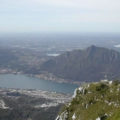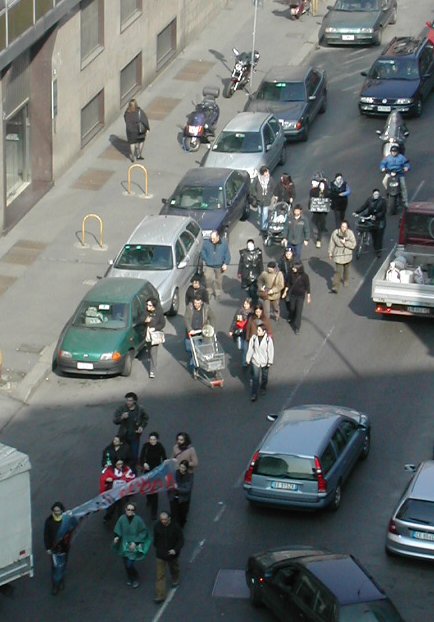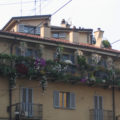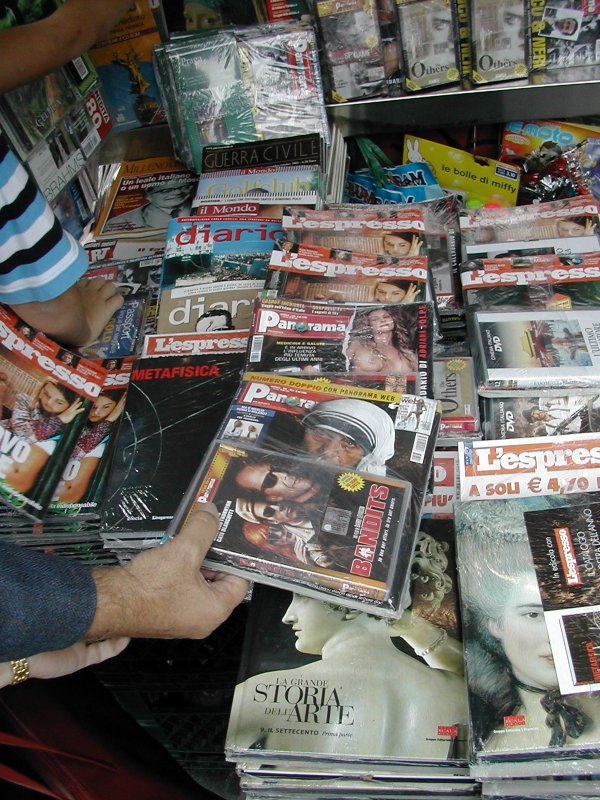The Lake Como Shore in Lecco
Boats, birds, blue, blue water, flags in the wind.
Italian Complaints
Since I began commuting regularly to Milan, it has been brought forcibly to my attention how much of Italian productivity is lost to strikes. I haven’t kept count, but it seems as if there has been something to prevent me from getting to the office about twice every month. Tuesday, Milan’s local transit system struck from 8:45 am to 12:45 pm. I could have reached Milan by train as usual, but then would have had to walk from Stazione Centrale to the office. It’s only a couple of kilometers, no big deal, but would have been much further for my colleagues whose trains arrive at the Porta Garibaldi station, and taxis are expensive in Milan. (In any case, I had to stay home in case the hospital suddenly called about that MRI we’ve been trying to schedule for my mother-in-law.)
Wednesday, the railway manovratori (maneuverers?) were on strike at Milano Centrale, so, to be safe, I took a train into Porta Garibaldi instead (coming from Lecco, I have this choice). It’s a slower train, so I had to get up earlier to arrive about the same time.
Last week there was a train strike from 9 pm to the next 9 pm, on a working day. In these situations there are “guaranteed” trains running during the rush hours, but I don’t trust this: somehow the disagi (inconveniences) manage to start well before and end well after the official strike schedule. Once last year, I went to the station at 5 pm, four hours before the strike was supposed to start. The train I’d intended to catch was cancelled. Getting home became a long, sweaty odyssey whose details are now mercifully dim, but it took over two hours to complete what is normally a 40-minute trip – for reasons that were never explained, and in spite of the fact that the strike was officially called off around 5:30! My husband, also in Milan that day, saw the mess of late and cancelled trains at the station and decided to stay in town for dinner; he had an uneventful ride home much later that night.
I’ve so far managed to avoid all the airport and airline strikes, through no particular cleverness of my own except trying not to fly Alitalia. Italy’s national carrier has been striking so much over the last few years that I wonder that anyone ever books on them anymore. This propensity to strike and cause passengers enormous hassles surely is not good for business: unlike train commuters, airline passengers have choices.
(However, when it’s the airport personnel who strike, as they also frequently do, we’re all in the same lousy, sinking boat…)
Fortunately, I can do some of my work from home as effectively as from the office, as can most of my colleagues, so a day out of the office is not a day wasted. But for other types of work where physical presence is important, it would be instructive to count up how many working days are lost to people not themselves on strike.
School strikes were frequent when our daughter was young, and I remember grinding my teeth in frustration many a time. That was before telecommuting, and I needed to be at the office, but, if school is closed, someone’s got to take care of the kids – which, in a two-job family, means that someone has to sacrifice a workday. Not every Italian family has retired grandparents nearby who can pitch in for emergencies (we didn’t).
<sigh> I do know something about the history of unions and strikes in the US and I suppose a right to strike is necessary to prevent abuses by management. But I get the impression that many strikers are largely concerned – and expect us to sympathize – with a very narrow self-interest. At some point Italy must consider the costs to the rest of society and whether, in its current economic straits, the country can afford so much organized complaint.
Strikers at least do not cause trouble beyond the inconvenience caused by lack of their services. Protesters, on the other hand, go to great lengths to bring attention to their cause, and don’t care what innocent bystander gets caught up in it. A few years ago, dairy farmers upset by an EU fine for over-production of milk blocked the road to Milan’s Linate airport with trucks, tractors, and a symbolic cow. Airline passengers – who had nothing to do with milk quotas and no influence on EU decisions about them – were forced to walk five kilometers, carrying their luggage. Other protesters have blocked roads and railway lines, often to protest the imminent closing of a no-longer-viable local heavy industry factory, and subsequent loss of jobs. By blocking vital infrastructure, they cause further damage to their already faltering local economies, but that never seems to occur to anybody.
Now, with the Olympics, troublemakers have an opportunity to perform on the world stage. For some months now, residents of an Alpine valley in Piemonte have been protesting about the TAV (Treno Alta Velocita’ – high speed train) being built from Milan to Paris, passing through their valley (as well as other parts of the region). When completed, this will make it possible to commute from Milan to Torino in 40 minutes, and on to France.
This seems like a good way to improve links while reducing road congestion, but the locals whose territory the train will pass through are upset about it. It seems to be a NIMBY (not in my backyard) thing – they don’t want to suffer through years of construction, when they expect no direct benefits from the train line. The “greater good” is not a popular concept in Italy.
The No-TAV people have already tried to hijack the progress of the Olympic torch, and will make as much trouble as they can around an Olympics already marked by security paranoia. The government says that it’s even more worried about the No-Global tykes, who, having demonstrated their capacity for violence at other international events, have now (according to the government) usurped the No-TAV cause.
It’s not terribly clear to me what the No-Global movement stands for or against, except a general sense of “capitalism is bad for poor countries” and “people with money are inherently evil.” But the Olympics hardly seems the right venue for their complaints, being one of the few occasions in which people from underprivileged nations can compete on (more or less) equal terms with the wealthy, and even beat them.
Informing the Public
Mar 15, 2007
One of my long-standing complaints about Italian strikes is that, while we usually have plenty of warning that they are about to happen (indeed, the threat usually brings management to the bargaining table, so strikes are often called off at the last minute), it’s rarely made clear to the public what the strike is about.
I had vaguely noticed that Milan was due for a local transit strike tomorrow, but I was expecting to be home anyway, so was not bothered about this. However, entering the metro to go home this evening, I was pleasantly surprised to be given a flier by an off-duty staff member, a full page explaining what the strike is about.
The flier says that since January 1st, Milan’s municipal transport authority has been “corporatized” into a new company, ATM Servizi SpA – this is news to me. There’s a misspelling in this first line, turning the word Servizi (services) into Sevizi(mutilations). I’m guessing that was done on purpose, since the sheet goes on to say that the ATM will be split into eight new companies.
The rest of the sheet elucidates the workers’ fears that this privatization will be as disastrous as that of the UK railways, leading to worsening conditions and pay for workers, worse service to passengers, and reduced maintenance and safety. I don’t feel qualified to comment on this as yet, but I’m glad that, for once, I know why these folks are striking.
above: a very small anti-war protest in Milan
Would You Like an Encyclopedia with That?
In Italy, for reasons that I will go into some other time, most shops are closed on Sundays. You can go to a restaurant or bar, sometimes you can buy fresh bread in the morning, and there’s always one pharmacy open somewhere (though you may have to hunt for it). But, even if you’ve been working or going to school Monday through Saturday, you can’t do any shopping on Sunday.
This is a sin and a shame. Shopping is a basic human instinct; it is cruel to give people a day of leisure, and deny them the opportunity to spend money during that day.
It is my firm belief that the Italian newsstand (edicola) exists for this reason. “Newsstand?” you may be wondering. “What kind of shopping can you do at a newsstand?”
Magazines and newspapers, of course, but not only. Italians don’t read much (according to laments from the Italian publishing industry), so they cannot be enticed to buy much for the mere sake of words printed on paper. There has to be a “gift” as well, sometimes included in the cover price, sometimes at a “special discount” if you also buy the newspaper or magazine.
Often this gift is more print, preferably in large series to encourage you to keep buying. Books published this way have run the gamut from classics to encyclopedias to comics. In the last couple of years I’ve seen two or three different gorgeous series of art books, and several of cookbooks (first by ingredient, then by region). Now we seem to be moving on to religion, with a newly-advertised series of “the great religious books, lavishly illustrated.”
A popular enclosure nowadays is a DVD, cheap at 5 to 10 euros. The great thing for us foreigners is that, unlike their VHS predecessors, these include the original-language soundtrack as well as the dubbed Italian – and it used to be so hard to find films in English!
Films, too, run in series e.g., the complete Woody Allen. Themed film collections distributed in this way can mix and match from various film studios, so you can collect (starting now) every film ever made based on a comic book. This follows two different print series of comics published in the last two years. I bought some of those, to add to my already eclectic comic collection; it was a nice, cheap way to get acquainted with some artists unfamiliar to me.
Some publishing houses baldly cash in on the human instinct to collect, dispensing with newspapers and magazines altogether. Each year brings new sets of “collectibles,” in monthly editions. “Accurate reproductions” of timepieces, or toy cars, or kitchen utensils, each with an explanatory pamphlet (I guess they have to include some paper, to qualify these items to be sold at the edicola).
So Italians out on their passeggiata (a leisurely stroll after a heavy Sunday lunch) can satisfy their shopping instinct at the edicola. Maybe it’s all a government plot to get people to read?
Bang!
I was walking along a street in Milan last Monday, heading to the bar with colleagues for our usual post-lunch coffee. There’s scaffolding on one of the buildings along the way, which was dripping water onto the sidewalk as the weekend’s snow melted. So I stepped under the scaffolding to avoid getting wet. And, exiting the scaffolding at the end, walked right into a horizontal gray steel bar that I completely failed to see, right at forehead level. I hit it so hard my head snapped back and I then banged my nose on the same bar. (I’m sure this looked very funny, but my colleagues were kind enough not to laugh at the time.)
I didn’t pass out or have any other immediate symptoms (not even amnesia, such as I experienced that time I fell off a horse onto my head), though I felt slightly dazed. But I’ve had a bad headache most of every day since then. Now I read:
“Delayed signs and symptoms [of concussion] may include:
- Irritability
- Headaches
- Depression
- Sleep disturbances, including insomnia or difficulty waking
- Fatigue
- Poor concentration
- Trouble with memory
- Getting lost or becoming easily confused
- Increased sensitivity to sounds, lights and distractions
- Loss of sense of taste or smell
- Difficulty with gait or in coordinating use of limbs”
Well, that describes (and explains) most of this week…










